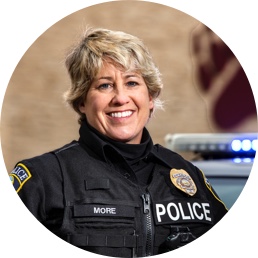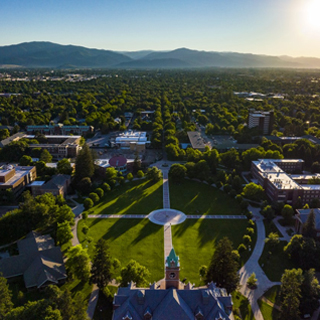UMPD Officer Shelagh More

On the occasional morning, Shelagh More stands near the waffle iron in UM’s Food Zoo, striking up light conversation with students while they wait for breakfast.
As the Special Victims Unit detective in the UM Police Department, she and other officers like to be visible to the students on campus wherever and whenever they can, including the Food Zoo, as part of UM’s commitment to safety.
“We’re not coming in to do enforcement, write tickets, make arrests,” she says. “We’re just here to eat some food. Most students, when they see you’re not in enforcement capacity, they relax.”
More contributes to a safe campus through her work following up on felony crimes whenever they take place at UM or involve a student, in conjunction with the Missoula Police Department Special Victims Unit. This close coordination between UMPD and the city’s police department is a notable community strength benefitting all students.
“The University setting, although it is encapsulated within the city of Missoula, is a unique environment in which to be a law enforcement officer,” More says.
She investigates assault, drug crimes, criminal mischief, domestic violence, rape, car accidents, thefts, stalking and more. Just as complex as the calls coming in to the city police department, some cases involve young adults just out of high school who may not know how the criminal justice system works.
A component of More’s job is informing students and speaking with resident assistants about the misinformation on police work during her walk-through of residence halls at night. She also speaks at Orientation and helps send our public service announcements to campus.
She says many students think the time frame for investigating felony crimes is similar to the popular TV show “CSI,” where results for evidence are received in seconds and someone’s location can by pinpointed right away. More says working a case in real life is a lot like writing a research paper. The process involves interviewing victims, suspects and witnesses, and report-writing, as well as examining evidence, which typically takes months.
“Criminal investigation takes time, it takes digging, it takes legwork,” More says. Doing this work with an eye toward rigor helps promote a safer campus environment.
